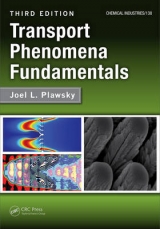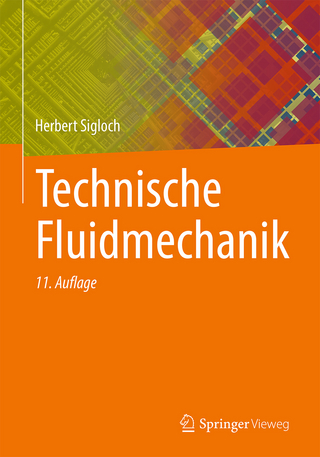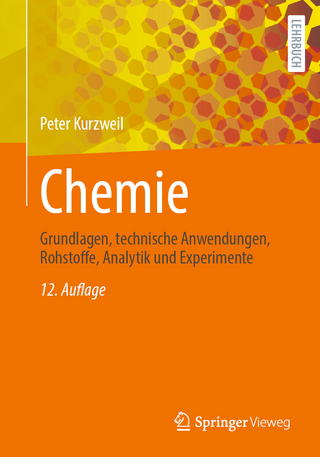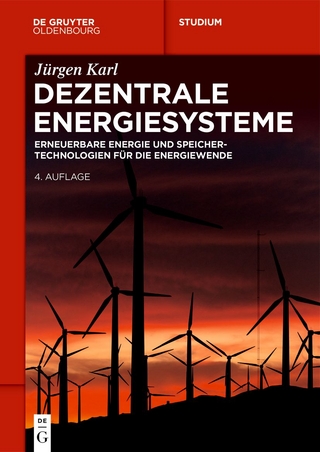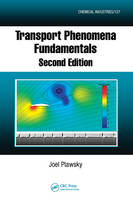
Transport Phenomena Fundamentals, Second Edition
Crc Press Inc (Verlag)
978-1-4200-6233-5 (ISBN)
- Titel erscheint in neuer Auflage
- Artikel merken
Although the practice of chemical engineering has broadened to encompass problems in a range of disciplines, including biology, biochemistry, and nanotechnology, one of the curriculum’s foundations is built upon the subject of transport phenomena. Transport Phenomena Fundamentals, Second Edition provides a unified treatment of heat, mass, and momentum transport based on a balance equation approach.
Designed for a two-term course
Used in a two-term transport phenomena sequence at Rensselaer Polytechnic Institute, this text streamlines the approach to how the subject is taught. The first part of the book takes students through the balance equation in the context of diffusive transport, be it momentum, energy, mass, or charge. Each chapter adds a term to the balance equation, highlighting the effects of that addition on the physical behavior of the system and the underlying mathematical description.
The second half of the book builds upon the balance equation description of diffusive transport by introducing convective transport terms, focusing on partial rather than ordinary differential equations. The Navier–Stokes and convective transport equations are derived from balance equations in both macroscopic and microscopic forms.
Includes examples and problems drawn from Comsol® software
The second edition of this text is now enhanced by the use of finite element methods in the form of examples and extended homework problems. A series of example modules are associated with each chapter of the text. Some of the modules are used to produce examples in the text, and some are discussed in the homework at the end of each chapter. All of the modules are located online at an accompanying website which is designed to be a living component of the course. (available on the download tab)
Joel Plawsky is a professor of chemical engineering at Rensselaer Polytechnic Institute in Troy, New York.
Introductory Concepts
Scope of Transport Phenomena
Preliminary Assumptions
Equilibrium Foundations
Defining Equilibrium
Fluid Statics
Buoyancy and Stability
Fluids in Rigid Body Motion
Fluxes, Gradients, and Transport Properties
Momentum Transport – Newton's Law of Viscosity
Energy Transport – Fourier's Law of Heat Conduction
Mass Transport – Fick's Law of Diffusion
Charge Transport – Ohm's Law of Conduction
Driving Force – Resistance Concepts
Flux Laws in Two and Three Dimensions
Mechanistic Differences Among the Transport Phenomena
Primary and Secondary Fluxes
Systems Involving Fluxes with Multiple Gradients
Failure of the Linear Flux–Gradient Laws
Transport Properties of Materials
Viscosity of Gases
Viscosity of Liquids – Free Volume Theory
Thermal Conductivity of Gases
Thermal Conductivity of Liquids
Thermal Conductivity of Solids
Diffusivity of Gases
Diffusivity of Liquids
Diffusion in Solids
Conductivity, Mobility and Resistivity
One-Dimensional, Steady-State, Diffusive Transport
Boundary Conditions
Boundary Condition Catalog
One-Dimensional, Steady-State Diffusive Transport
Composite Media
Variable Transport Properties, Coupled Transport, and Multiple Fluxes
Generation
Generation on the Boundary – Boundary Conditions
One-Dimensional Transport with Generation at the Boundary
Constant Generation Terms
Variable Generation and Coupled Transport
Accumulation
Lumped Capacitance
Internal Gradients and Generalized Solutions
Semi-Infinite Systems
Miscellaneous Transient Example Problems
Conservative Transport and Waves
Momentum Transport
Transport Enhancement Using Extended Surfaces
Heat Transfer - Finned Surfaces
Mass Transfer - Gills, Lungs, and So On
Diffusion and Reaction in a Catalyst Pellet
Multidimensional Effects, Potential Functions, and Fields
Laplace's Equation and Fields
Solutions of Laplace's Equation
Generation, Sources, Sinks and Poisson's Equation
Transient Systems
Convective Transport : Microscopic Balances
Momentum Transport
Energy Transport
Mass Transport
Charge Transport
Macroscopic or Engineering Balances
Macroscopic Continuity Equation
Macroscopic Momentum Balance
Macroscopic Mechanical Energy Balance – Extended
Macroscopic Energy Balance
Macroscopic Species Continuity Equation
Macroscopic Charged Species Continuity Equation
Convective Transport on a Flat Plate (Laminar Boundary Layers)
Convective Transport Coefficients, Cf, h, kc,k±
Boundary Layer Definitions
Derivation of the Boundary Layer Equations
Transport Analogies
Hydrodynamic Boundary Layers
Thermal Boundary Layers
Mass Transfer Boundary Layers
Simplified Ionic Boundary Layers
Convective Transport: Systems with Curvature
Flow Over Cylinders
Flow Over Spheres
Velocity Profile in Tubes
Heat and Mass Transfer Applications
Taylor Dispersion
Turbulent Boundary Layers
Turbulent Boundary Layer Structure
Transport Equations in Turbulent Flow
Representing the Reynolds Flux Components
Friction Factors and Other Transport Coefficients
Radiative Transport
Preliminary Definitions
Maxwell's Equations and Heat Transfer
Energy Fluxes in Radiative Systems
The Blackbody
The Graybody
View Factors
Radiative Energy Exchange
Nomenclature
Appendix A: Vector Mathematics
Appendix B: Mathematical Functions and Heisler Charts
Appendix C: Exact Solution to the Boundary Layer Equations
Appendix D: Thermal and Transport Properties of Materials
Index
| Erscheint lt. Verlag | 3.12.2009 |
|---|---|
| Zusatzinfo | over 100 - text prints PMS 3005 + Black; 57 Tables, black and white; 471 Illustrations, black and white |
| Verlagsort | Bosa Roca |
| Sprache | englisch |
| Maße | 178 x 254 mm |
| Gewicht | 1769 g |
| Themenwelt | Naturwissenschaften ► Chemie ► Technische Chemie |
| Technik | |
| ISBN-10 | 1-4200-6233-6 / 1420062336 |
| ISBN-13 | 978-1-4200-6233-5 / 9781420062335 |
| Zustand | Neuware |
| Informationen gemäß Produktsicherheitsverordnung (GPSR) | |
| Haben Sie eine Frage zum Produkt? |
aus dem Bereich
